Samuel Hume, Fellow at The Foulkes Foundation and pursuing PhD in the University of Oxford’s Department of Oncology, shared a post on X:
“Top 5 advances in medicine in May
1. A record-breaking genetic therapy
This bespoke CRISPR therapy was tailored for one patient’s mutation, breaking two records: the first personalised gene editing, and (possibly) the fastest a medicine’s ever been produced
There’s a small risk of off-target editing, a requirement for lifelong immunosuppression, and how this looks in the long-term isn’t known
Despite the limitations, this approach could – in theory – be used to treat hundreds of rare genetic illnesses.”
Title: Patient-Specific In Vivo Gene Editing to Treat a Rare Genetic Disease
Authors: Kiran Musunuru, Sarah A. Grandinette, Xiao Wang, Taylor R. Hudson, Kevin Briseno, Anne Marie Berry, Julia L. Hacker, Alvin Hsu, Rachel A. Silverstein, Logan T. Hille, Aysel N. Ogul, Nancy A. Robinson-Garvin, Juliana C. Small, Sarah McCague, Samantha M. Burke, Christina M. Wright, Sarah Bick, Venkata Indurthi, Shweta Sharma, Michael Jepperson, Christopher A. Vakulskas, Michael Collingwood, Katie Keogh, Ashley Jacobi, Morgan Sturgeon, Christian Brommel, Ellen Schmaljohn, Gavin Kurgan, Thomas Osborne, He Zhang, Kyle Kinney, Garrett Rettig, Christopher J. Barbosa, Sean C. Semple, Ying K. Tam, Cathleen Lutz, Lindsey A. George, Benjamin P. Kleinstiver, David R. Liu, Kim Ng, Sadik H. Kassim, Petros Giannikopoulos, Mohamad-Gabriel Alameh, Fyodor D. Urnov, Rebecca C. Ahrens-Nicklas
You can read the Full Article on The New England Journal of Medicine
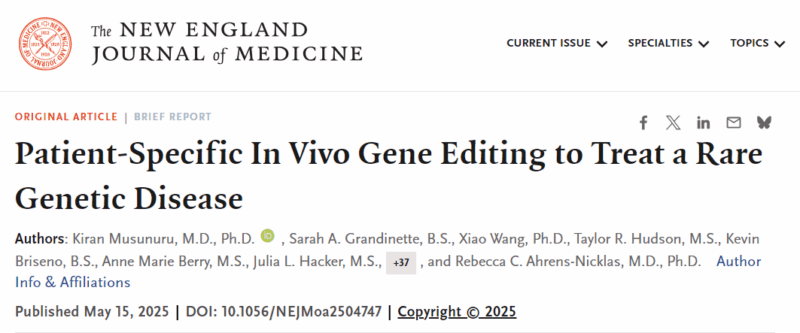
“2. A new approach to tackle malaria
Malaria deaths have halved since the year 2000, but progress is slowing
Insecticide-treated nets are effective, but mosquitoes are evolving resistance to the insecticides
This approach targets the parasite rather than the mosquito – with 100% efficacy for killing parasites in mosquitoes that land on the nets
There’s no data from the field yet, but – combined with other approaches, and with further optimisation – this could lead to more countries eliminating malaria”
Title: In vivo screen of Plasmodium targets for mosquito-based malaria control
Authors: Alexandra S. Probst, Douglas G. Paton, Federico Appetecchia, Selina Bopp, Kelsey L. Adams, Tasneem A. Rinvee, Sovitj Pou, Rolf Winter, Esrah W. Du, Sabrina Yahiya, Charles Vidoudez, Naresh Singh, Janneth Rodrigues, Pablo Castañeda-Casado, Chiara Tammaro, Daisy Chen, Karla P. Godinez-Macias, Jasmine L. Jaramillo, Giovanna Poce, Michael J. Rubal, Aaron Nilsen, Elizabeth A. Winzeler, Jake Baum, Jeremy N. Burrows, Michael K. Riscoe, Dyann F. Wirth & Flaminia Catteruccia
You can read the Full Article on Nature
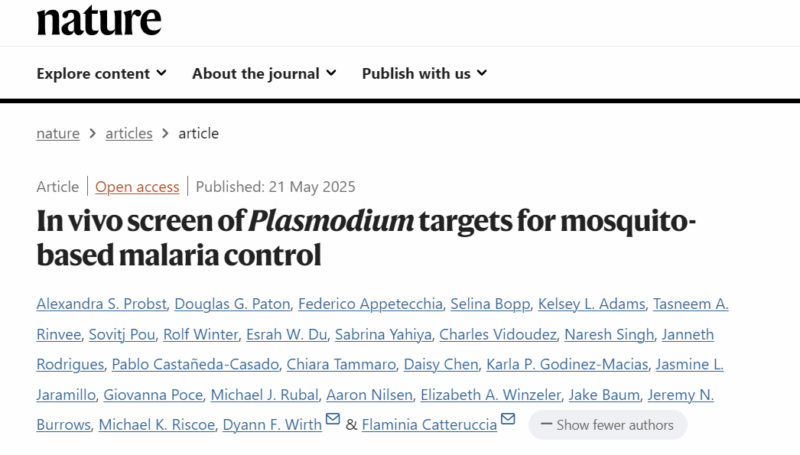
“3. A possible emerging therapy for ALS
ALS is the most common form of motor neuron disease – there’s only one medication approved in the US and Europe that improves survival in ALS: Riluzole
This is a phase 2b trial that tested whether lowering neuroinflammation could help patients with ALS – using low doses of the cytokine, IL2
There was no benefit in the full trial population but, in the ~70% of patients with less aggressive disease, there was an improvement to overall survival
There’s still a number of things to work out here: why didn’t IL2 slow down the rate of motor neuron loss, why was inflammation not reduced in the CSF, and why did it not help the patients with the most aggressive disease?
We need to see the phase 3 trial data, which may answer these questions – but these are exciting data for a potentially simple way to improve outcomes in ALS”
Title: Efficacy and safety of low-dose IL-2 as an add-on therapy to riluzole (MIROCALS): a phase 2b, double-blind, randomised, placebo-controlled trial
Authors: Gilbert Bensimon, P. Nigel Leigh, Timothy Tree, Andrea Malaspina, Christine A.M. Payan, Hang-Phuong Pham, Pieter Klaassen, Pamela J. Shaw, Ahmad Al Khleifat, Maria D.M. Amador, Shahram Attarian, Simon M. Bell, Stéphane Beltran, Emilien Bernard, William Camu, Philippe Corcia, Jean-Christophe Corvol, Philippe Couratier, Véronique Danel, Rabab Debs, Claude Desnuelle, Aikaterini Dimitriou, John Ealing, Florence Esselin, Marie-Céline Fleury, George H. Gorrie, Aude-Marie Grapperon, Adèle Hesters, Raul Juntas-Morales, Ivan Kolev, Géraldine Lautrette, Nadine Le Forestier, Christopher J. McDermott, Nicolas Pageot, François Salachas, Nikhil Sharma, Marie-Hélène Soriani, Jemeen Sreedharan, Juliette Svahn, Nick Verber, Annie Verschueren, Ozlem Yildiz, Carey M. Suehs, Safaa Saker-Delye, Claudie Muller, Christophe Masseguin, Hana Hajduchova, Janine Kirby, Cecilia Garlanda, Massimo Locati, Henrik Zetterberg, Bernard Asselain, Ammar Al-Chalabi
You can read the Full Article on The Lancet Journal
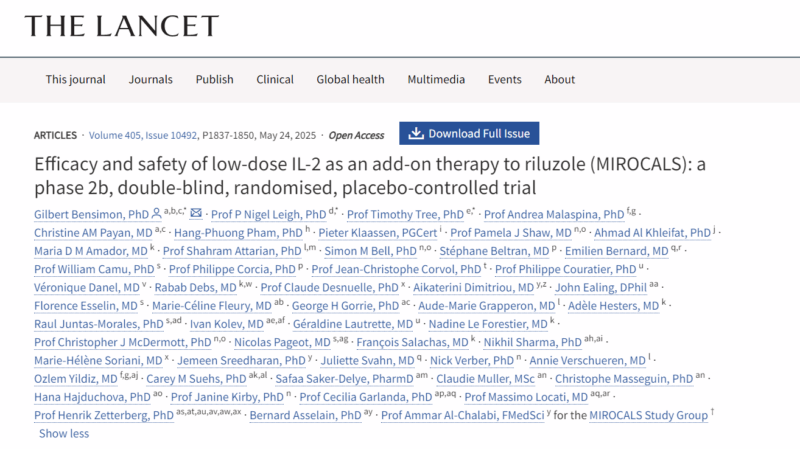
“4. The first win for CAR-T cells in a solid tumour
~40 % of gastric cancers express CLDN18.2, a tight-junction antigen – it’s the target of approved and emerging therapies
CAR-T cells are edited T cells that target and kill cancer cells – this is a phase 2 trial of a CLDN18.2-targeting CAR-T therapy, in gastric cancer
It’s the first randomized trial of a CAR-T therapy in any solid cancer
Tested as third-line therapy vs. the physician’s choice, CAR-Ts extended progression-free survival, although serious adverse events were very common (95 % of CAR-T recipients had cytokine release syndrome)
Next steps: test this CAR-T therapy in earlier lines of therapy, shorten CAR-T manufacturing time, and develop off-the-shelf (and even in-vivo editing) approaches.”
Title: Claudin-18 isoform 2-specific CAR T-cell therapy (satri-cel) versus treatment of physician’s choice for previously treated advanced gastric or gastro-oesophageal junction cancer (CT041-ST-01): a randomised, open-label, phase 2 trial
Authors: Changsong Qi, Chang Liu, Zhi Peng, Yanqiao Zhang, Jia Wei, Wensheng Qiu, Xiaotian Zhang, Hongming Pan, Zuoxing Niu, Meng Qiu, Yanru Qin, Weijia Fang, Feng Ye, Ning Li, Tianshu Liu, Anwen Liu, Xizhi Zhang, Changlu Hu, Jun Zhang, Jiuwei Cui, Xiaoyan Lin, Shubin Wang, Jian Zhang, Tongyu Lin, Xiujuan Qu, Xianglin Yuan, Jifang Gong, Jian Li, Wanwan Gao, Lun Gai, Yumeng Wang, Daijing Yuan, Zonghai Li, Lin Shen
You can read the Full Article on The Lancet Journal
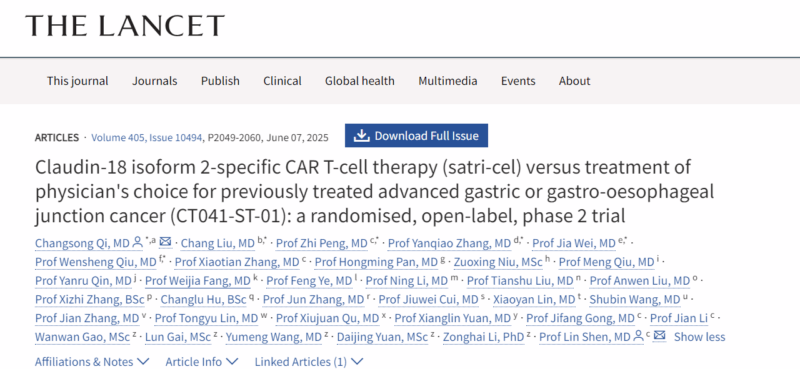
“5. A new antifibrotic slows progression of lung fibrosis
Idiopathic pulmonary fibrosis is scarring of the lungs with no clear cause (it’s ‘idiopathic’)
There are two approved antifibrotic medications: Nintedanib or Pirfenidone, but fibrosis usually progresses despite these treatments
This is a phase 3 trial that tested Nerandomilast, a PDE4-B inhibitor that’s anti-inflammatory and anti-fibrotic
Added to existing antifibrotic therapy, Nerandomilast slowed the decline in lung function (at the expense of gastrointestinal side-effects)
Whether this reduces hospitilisation/death isn’t yet known, and it did not reverse the decline in lung function
Filings for approval are expected this year.”
Title: Nerandomilast in Patients with Idiopathic Pulmonary Fibrosis
Authors: Luca Richeldi, Arata Azuma, Vincent Cottin, Michael Kreuter, Toby M. Maher, Fernando J. Martinez, Justin M. Oldham, Claudia Valenzuela, Emmanuelle Clerisme-Beaty, Maud Gordat, Daniel Wachtlin, Yi Liu, Christina Schlecker, Susanne Stowasser, Donald F. Zoz, Marlies S. Wijsenbeek
You can read the Full Article on The New England Journal of Medicine
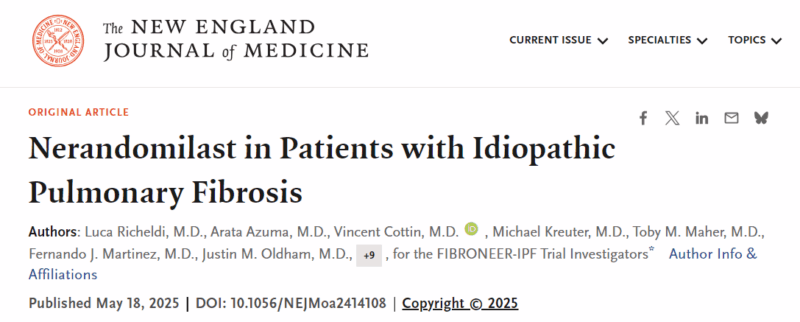
More posts featuring Samuel Hume.


